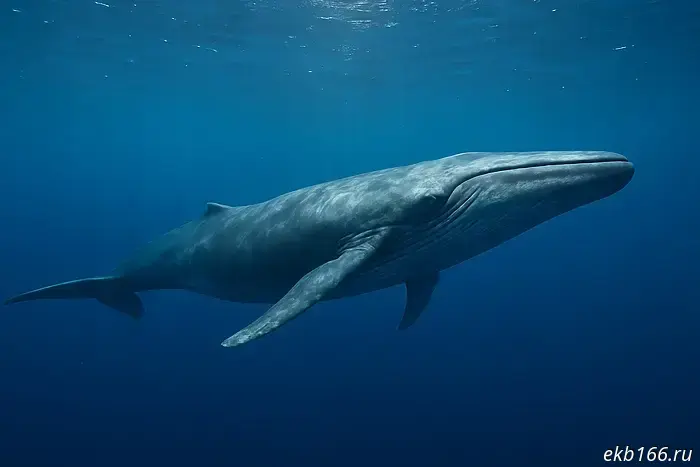
A scientist from Yekaterinburg proved that whales lived in the Urals.
Scientists from Yekaterinburg have determined that more than 37 million years ago predatory whales lived in the Ural region. Associate Professor of the Department of Biodiversity and Bioecology at UrFU Maxim Sinitsa discovered a tooth of an ancient Eocene whale during an expedition of the Ural-Siberian Paleontological Society. The find was made on the bank of the Tura River in Sverdlovsk Oblast.
According to preliminary data, the tooth belonged to a representative of the genus basilosaurids — extinct predatory whales.
"The whale tooth is an extremely rare find. Such specimens are hundreds of thousands of times rarer than shark teeth. Besides, whales were apex predators, and there were always few of them. Most likely they preyed on sharks," Maxim Sinitsa told E1.RU.
The researcher noted that ancient whales lived in warm seas, and their remains were first discovered in North Africa, where a sea once stretched millions of years ago. Basilosaurids had long, flexible bodies resembling snakes and did not have an organ for echolocation like modern whales. Some retained rudimentary limbs, presumably used during mating.
The predatory whales fed on large prey, had about 40 powerful front teeth resembling canines, while the rear teeth were flattened and multicusped. The found fragment turned out to be part of a cheek tooth. Male basilosaurids reached up to 21 meters in length, females up to 18 meters. Judging by the size of the tooth, the found specimen was smaller.
The rare artifact will be transferred to the Paleontological Institute in Moscow, where the only specialist in ancient cetaceans in Russia will be able to determine its exact age.
Earlier, two years ago, scientists found a fragment of an ancient whale rib in the Urals, but that artifact proved to be uninformative. The story of that find was included in the documentary about Middle Ural paleontology "Prehistoric Creatures of the Ancient Urals," released in September 2024.
Earlier we wrote that Sverdlovsk scientists created a unique fuel cell.
Scientists warned of the threat of an environmental catastrophe in Sverdlovsk Oblast.
Другие Новости Екатеринбурга (ЕКБ166)
 Early voting has begun for the elections in Sverdlovsk Oblast.
Early voting has begun in the gubernatorial election in Sverdlovsk Oblast for residents of remote and hard-to-reach areas. According to the regional election commission, voting has been organized for 48 groups of voters in seven municipalities.
Early voting has begun for the elections in Sverdlovsk Oblast.
Early voting has begun in the gubernatorial election in Sverdlovsk Oblast for residents of remote and hard-to-reach areas. According to the regional election commission, voting has been organized for 48 groups of voters in seven municipalities.
 Residents of Yekaterinburg didn't fly abroad because they couldn't get on the plane.
A conflict arose at Moscow’s Domodedovo Airport on September 4 over a Ural Airlines flight to Yerevan. The airline replaced the plane with a smaller one, and there were not enough seats for all passengers, Baza reports.
Residents of Yekaterinburg didn't fly abroad because they couldn't get on the plane.
A conflict arose at Moscow’s Domodedovo Airport on September 4 over a Ural Airlines flight to Yerevan. The airline replaced the plane with a smaller one, and there were not enough seats for all passengers, Baza reports.
 A billionaire on the Forbes list enrolled at UrFU.
Billionaire and entrepreneur Igor Rybakov, who is listed in Forbes, has been admitted to the postgraduate program at Ural Federal University. According to an admission document he published, the businessman will study full-time and as a fee-paying student in the field of philosophy.
A billionaire on the Forbes list enrolled at UrFU.
Billionaire and entrepreneur Igor Rybakov, who is listed in Forbes, has been admitted to the postgraduate program at Ural Federal University. According to an admission document he published, the businessman will study full-time and as a fee-paying student in the field of philosophy.
.jpg) Acting Governor of Sverdlovsk Oblast Denis Pasler named his place of power (PHOTO)
Acting governor of Sverdlovsk Oblast Denis Pasler boasted about his "catch". The politician had a successful trip to the forest to pick mushrooms. — Which Sverdlovsk resident doesn't go to the forest to pick mushrooms?
Acting Governor of Sverdlovsk Oblast Denis Pasler named his place of power (PHOTO)
Acting governor of Sverdlovsk Oblast Denis Pasler boasted about his "catch". The politician had a successful trip to the forest to pick mushrooms. — Which Sverdlovsk resident doesn't go to the forest to pick mushrooms?
 In Yekaterinburg, a teenage scooter rider doused a passerby with pepper spray over a remark.
In Yekaterinburg, a teenager on an electric scooter sprayed pepper spray into the face of a man who was walking with his wife and children. The victim suffered a chemical burn to his eyes and risks losing his sight, his wife Veronika told E1.RU.
In Yekaterinburg, a teenage scooter rider doused a passerby with pepper spray over a remark.
In Yekaterinburg, a teenager on an electric scooter sprayed pepper spray into the face of a man who was walking with his wife and children. The victim suffered a chemical burn to his eyes and risks losing his sight, his wife Veronika told E1.RU.
 In Yekaterinburg, tickets for "The Nutcracker" are now being sold for 20,000 rubles.
Ticket sales for New Year’s productions have begun at the Ural Opera Ballet Theatre. The most expensive for audiences will be performances of the ballet "The Nutcracker", while the most affordable option is the family opera "Morozko."
In Yekaterinburg, tickets for "The Nutcracker" are now being sold for 20,000 rubles.
Ticket sales for New Year’s productions have begun at the Ural Opera Ballet Theatre. The most expensive for audiences will be performances of the ballet "The Nutcracker", while the most affordable option is the family opera "Morozko."
A scientist from Yekaterinburg proved that whales lived in the Urals.
Scientists from Yekaterinburg established that more than 37 million years ago predatory whales inhabited the Urals. Associate Professor of the Department of Biodiversity and Bioecology at Ural Federal University, Maxim Sinitsa, discovered the tooth of an ancient Eocene whale during an expedition of the Ural‑Siberian Paleontological Society.
